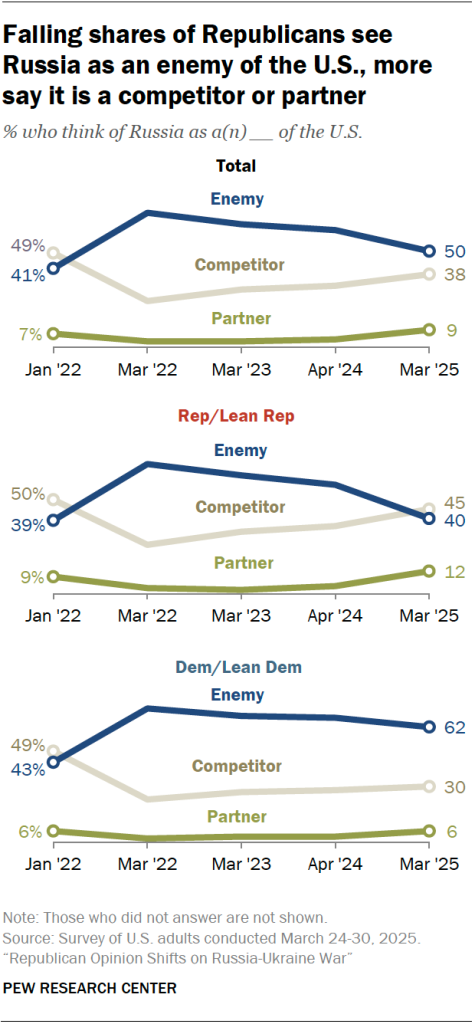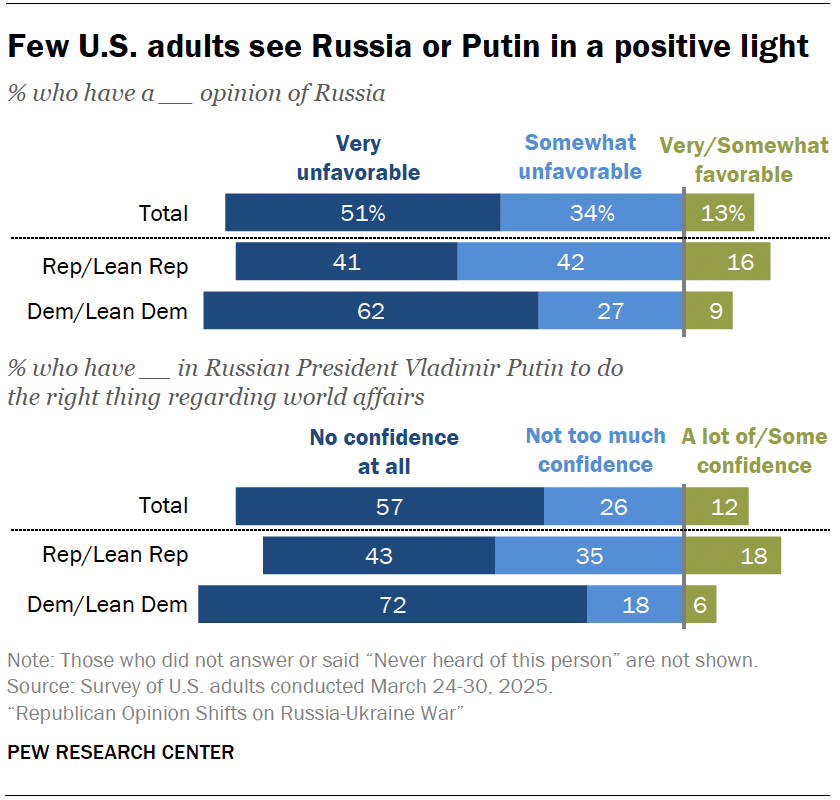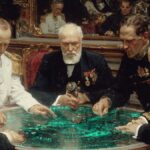The ongoing Russia-Ukraine war continues to influence global politics, particularly in the United States, where public opinion has sharply divided along partisan lines. In this blog post, we explore the significant shifts in Republican and Democratic views regarding the conflict, NATO, and U.S. involvement.

Partisan Divide: The Changing Republican Stance on Russia
Over the past year, there has been a noticeable shift in how Republicans view Russia, marking a departure from traditional perceptions. A recent Pew Research Center survey revealed that fewer Republicans now consider Russia an enemy of the United States. In fact, 40% of Republicans now see Russia as an enemy, a significant drop from 58% last year. Instead, more Republicans view Russia as a competitor or even a partner.
This change in opinion is not isolated but reflects broader shifts in American political thought. While the majority of Democrats still view Russia as an adversary, with only a 5% drop over the same period, Republicans have become less likely to express concern about Russia’s intentions. Many Republicans are less worried about the possibility of Russia defeating Ukraine or expanding its influence in Eastern Europe.

Views on NATO: A Stark Partisan Contrast
NATO, the North Atlantic Treaty Organization, continues to be a topic of debate, especially regarding its role in U.S. foreign policy. The Pew Research survey highlights a striking partisan gap in opinions about NATO. Democrats are far more likely than Republicans to view NATO positively. While about two-thirds of Americans believe the U.S. benefits from NATO membership, this percentage has decreased slightly since 2021, particularly among Republicans. From 71% in 2021, only 66% of Americans now feel that NATO membership benefits the U.S.
This decline is primarily attributed to the shifting views of Republicans, with many expressing less enthusiasm for NATO’s role in global affairs. On the other hand, Democrats maintain a steady support for the alliance, underscoring their broader commitment to international diplomacy and security.
Russia and Putin: A Shared Distrust, but Republicans Warming Up
While the majority of Americans harbor unfavorable views of Russia and President Vladimir Putin, there has been a slight increase in the number of Republicans who view Russia more favorably. Only 13% of U.S. adults hold a positive opinion of Russia, and just 12% express confidence in Putin’s ability to manage global affairs. However, Republicans are somewhat more inclined to express confidence in Putin than Democrats, with 43% of Republicans showing some level of trust compared to just 12% of Democrats.
These findings suggest that, while both parties maintain a negative stance towards Russia, Republicans are less likely to express outright hostility, reflecting their evolving perspectives on international relations.

The Russia-Ukraine War: Rising Concerns Among Democrats
As the Russia-Ukraine war continues to unfold, Americans remain deeply concerned about the potential global consequences. According to the Pew survey, 47% of Americans express extreme or significant concern about Russia’s potential to invade other countries, while 43% worry about Russia defeating Ukraine and taking control of the country.
However, this concern is far more pronounced among Democrats, with a larger proportion of them worried about the broader implications of Russia’s actions. Republicans, on the other hand, have become less concerned about these developments in recent months.
The war’s importance to U.S. interests is broadly acknowledged by both parties, with a majority of both Republicans and Democrats agreeing that the conflict is significant to the country’s future. Still, Democrats are more likely to see the war as a personal issue, with 66% of them feeling personally affected, compared to just 47% of Republicans.
Confidence in Ukrainian Leadership: A Clear Partisan Divide
One of the most glaring differences between the two major political parties is their views on Ukrainian President Volodymyr Zelenskyy. Democrats are much more likely than Republicans to express confidence in Zelenskyy’s leadership. While 70% of Democrats trust him to do the right thing in world affairs, only 30% of Republicans share the same sentiment.
This division reflects the broader partisan split in the U.S. over foreign policy and the role the U.S. should play in supporting Ukraine’s sovereignty. As the conflict continues, the United States’ position on Ukraine and NATO will remain a critical point of contention in both political circles and among the American public.

Conclusion: A Nation Divided on Global Strategy
The shifting opinions on the Russia-Ukraine war and NATO membership showcase the deepening partisan divide in the U.S. While Democrats remain steadfast in their support for Ukraine and NATO, Republicans are reevaluating their stance on Russia and the U.S.’s role in international affairs. As the war continues, these divisions are likely to play a crucial role in shaping U.S. foreign policy in the years to come.
For more insights and updates on global affairs, stay tuned to WorldAffair.org, your go-to source for analysis on international politics and U.S. foreign policy.
Author Profile
- Syed Tahir Abbas is a Master's student at Southwest University, Chongqing, specializing in international relations and sustainable development. His research focuses on U.S.-China diplomacy, global geopolitics, and the role of education in shaping international policies. Syed has contributed to academic discussions on political dynamics, economic growth, and sustainable energy, aiming to offer fresh insights into global affairs.
Latest entries
 U.S. Foreign PolicyFebruary 2, 2026AI and Grand Strategy: The Case for Restraint – Navigating the Future of American Power
U.S. Foreign PolicyFebruary 2, 2026AI and Grand Strategy: The Case for Restraint – Navigating the Future of American Power National SecurityJanuary 31, 2026Treating China’s Connected Energy Systems as a National Security Risk
National SecurityJanuary 31, 2026Treating China’s Connected Energy Systems as a National Security Risk Global HealthJanuary 29, 2026The Future of the WHO—and How the United States Can Shape It
Global HealthJanuary 29, 2026The Future of the WHO—and How the United States Can Shape It Global TradeJanuary 22, 2026Trump Cancels Tariffs on European Nations Over Greenland Pursuit?
Global TradeJanuary 22, 2026Trump Cancels Tariffs on European Nations Over Greenland Pursuit?



1 comment
Here are four friendly and engaging comments you can leave for your blogger
Such a great read! I love how you explained this topic in such a clear and relatable way.